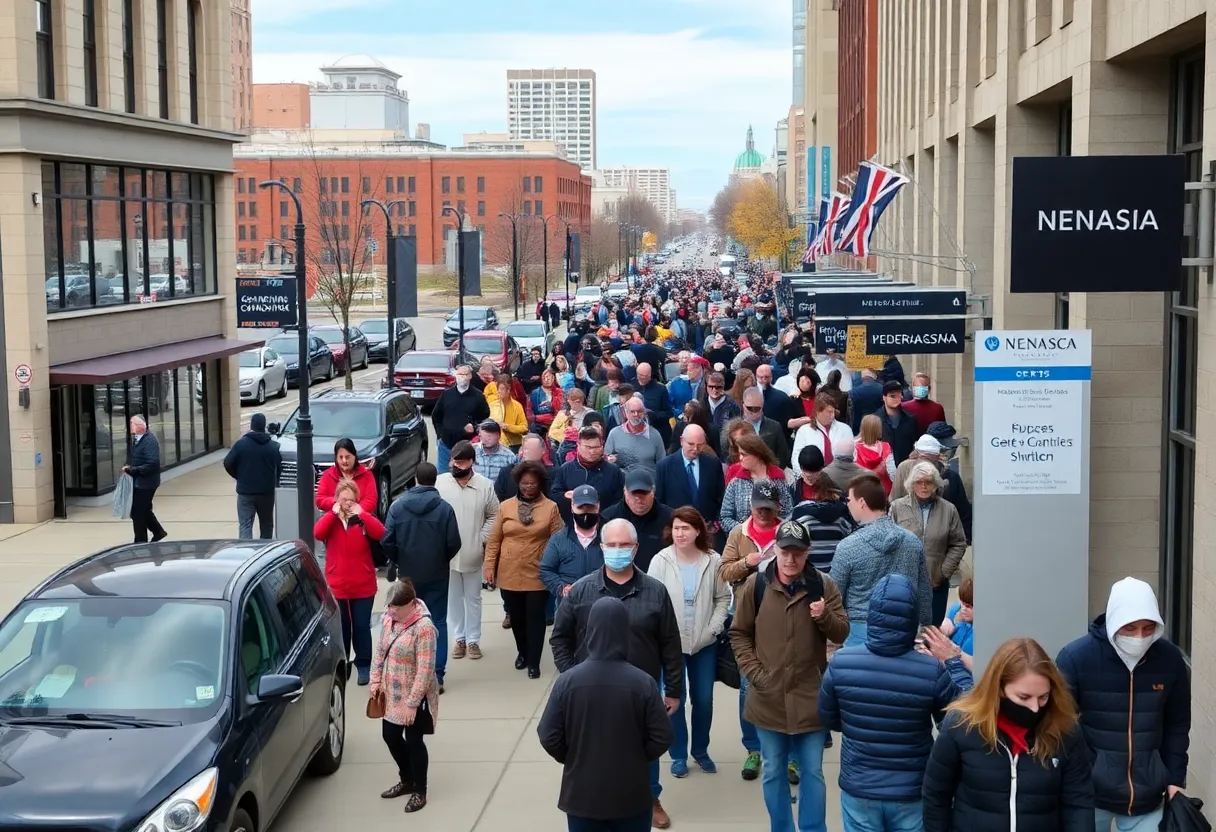Omaha, October 6, 2025
The ongoing federal government shutdown has disrupted vital state programs in Nebraska, leading to frustration among local leaders. Delays in agricultural aid and veterans’ services are affecting many residents. As tensions rise, U.S. Rep. Don Bacon has called for urgent resolution, while Governor Jim Pillen warns of significant funding losses that could impede crucial state initiatives. Small businesses are also bracing for economic impacts as protests are organized in response to the gridlock in Washington.
Federal Government Shutdown Impacts Nebraska Programs as Tensions Rise
Omaha
The ongoing federal government shutdown, now in its fifth day, has sparked growing frustration among local leaders in Nebraska. State programs face significant disruptions, with delays affecting agricultural aid, veterans’ services, and other essential operations. Residents across the state are experiencing longer wait times at federal offices, while small businesses worry about economic ripple effects from the standstill in Washington.
U.S. Rep. Don Bacon addressed these issues during a press conference in Omaha, emphasizing how the shutdown is halting critical support for farmers and military veterans. The interruption comes at a particularly challenging time for Nebraska’s agricultural sector, which relies heavily on timely federal assistance to manage seasonal demands. Local officials report that processing times for applications have extended dramatically, leaving many in limbo.
Governor Jim Pillen has urged bipartisan action to resolve the impasse, pointing out that Nebraska stands to lose $2 billion in at-risk funding if the shutdown persists. This funding supports a range of initiatives, including infrastructure projects, education programs, and disaster relief efforts. Without swift intervention, these resources could be withheld indefinitely, exacerbating financial strains on state and local governments.
Effects on Residents and Businesses
Everyday Nebraskans are feeling the immediate pinch of the shutdown. Lines at federal facilities in cities like Omaha and Lincoln have grown noticeably longer, as understaffed offices struggle to handle routine tasks such as passport renewals, tax assistance, and benefit enrollments. For veterans, this means postponed access to healthcare and disability claims processing, adding to existing backlogs.
Small businesses, particularly those dependent on federal contracts or grants, are bracing for broader economic fallout. Owners express concerns that delayed payments could lead to cash flow problems, potentially forcing layoffs or reduced operations. In rural areas, where agriculture drives the economy, the holdup in aid programs is seen as a direct threat to farm viability during harvest season.
Protests and Political Response
As negotiations in Washington stall, protests are being organized at the Nebraska state capitol in Lincoln. Community groups and affected stakeholders plan to gather to voice their discontent and press for a resolution. These demonstrations aim to highlight the human cost of the political gridlock, drawing attention to how federal decisions reverberate through local communities.
The shutdown stems from disagreements over budget priorities and spending bills, a recurring issue that has led to similar disruptions in the past. This instance marks the fifth time in the last decade that such a stalemate has forced non-essential federal services to pause. Nebraska, with its strong ties to federal agriculture and defense sectors, feels these interruptions more acutely than many states.
Background on the Shutdown
Government shutdowns occur when Congress fails to pass funding legislation by the deadline, leading to the suspension of non-critical operations. Essential services, such as air traffic control and national security, continue, but many agencies furlough employees and halt projects. In Nebraska, this has amplified existing pressures from recent economic challenges, including supply chain issues and inflation.
Historically, these shutdowns have varied in length, with some lasting days and others extending to weeks. The current situation, entering its fifth day, shows no immediate signs of resolution, prompting local leaders to explore state-level workarounds where possible. However, the scale of federal involvement in Nebraska’s economy limits these options, making federal action essential.
Experts note that prolonged shutdowns can cost the national economy billions, with ripple effects hitting states like Nebraska hardest through lost productivity and delayed investments. As the situation unfolds, state officials continue to monitor developments and provide updates on impacted programs.
The frustration in Nebraska reflects a broader national sentiment, but local impacts underscore the urgency for compromise. With protests on the horizon and funding at stake, the pressure mounts for lawmakers to bridge divides and restore normal operations.
(Word count: 612)
FAQ
What is causing the growing frustration among local leaders in Nebraska?
Local leaders in Nebraska expressed growing frustration over the ongoing federal government shutdown, now in its fifth day, impacting state programs.
How is the federal government shutdown affecting agricultural aid and veterans’ services?
U.S. Rep. Don Bacon highlighted delays in agricultural aid and veterans’ services during a press conference in Omaha.
What challenges are residents and small businesses facing due to the shutdown?
Residents report longer wait times at federal offices, while small businesses fear economic ripple effects.
What funding is at risk for Nebraska?
Governor Jim Pillen called for bipartisan action, noting Nebraska’s $2 billion in at-risk funding.
What actions are planned in response to the stalled negotiations?
Protests are planned at the state capitol as negotiations stall in Washington.
Key Features Chart
| Key Feature | Description |
|---|---|
| Duration of Shutdown | Now in its fifth day |
| Primary Impacts | Delays in agricultural aid, veterans’ services, longer wait times at federal offices |
| Economic Concerns | Small businesses fear economic ripple effects; $2 billion in at-risk funding for Nebraska |
| Political Response | Governor calls for bipartisan action; protests planned at state capitol |
| Location of Press Conference | Omaha |
Deeper Dive: News & Info About This Topic
HERE Resources
Omaha Farmers’ Market Launches in West Omaha
Housing Sales Surge in Omaha’s Market
Omaha Launches New Small Business Loan Program
Omaha Public Schools Launches ‘Park and Play’ Program
Federal Shutdown Disrupts Life in Omaha, Nebraska


